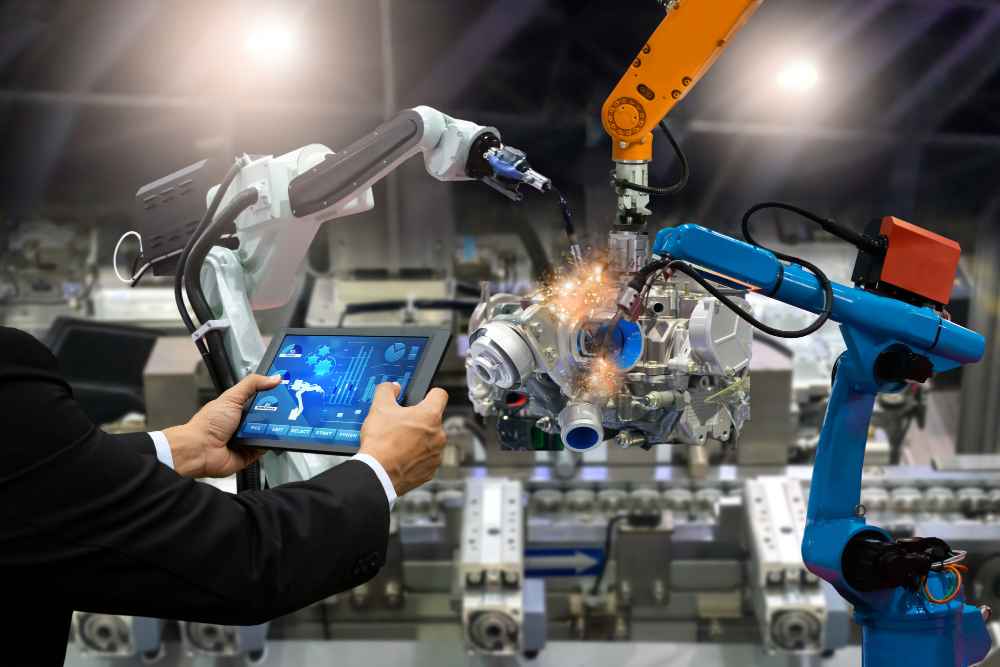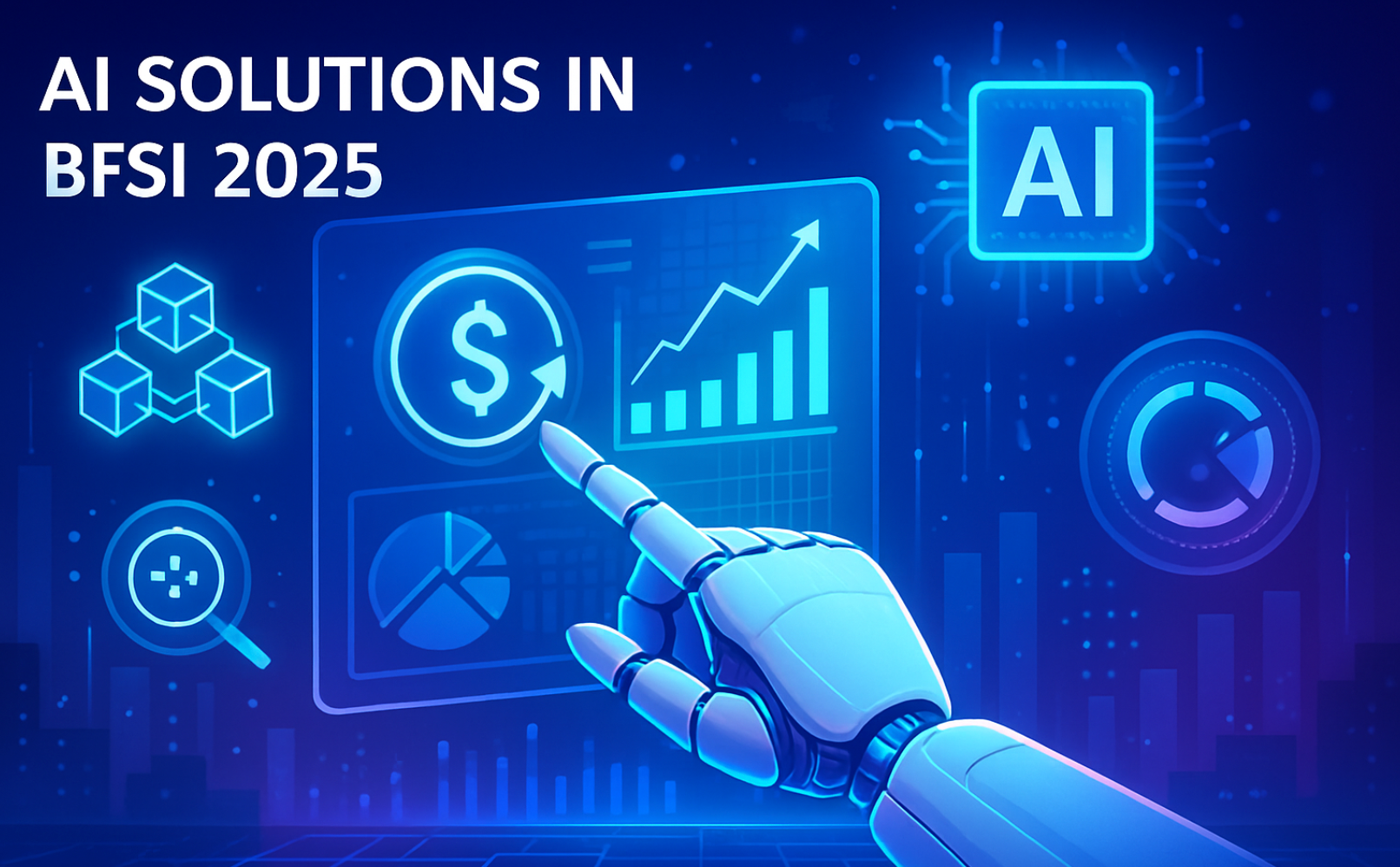Ankit Kumar 2025-08-01
The retail landscape is undergoing a profound transformation, driven by the relentless pace of technological innovation. At the forefront of this revolution is Artificial Intelligence (AI), a force reshaping how businesses interact with customers, manage operations, and strategize for future growth. The integration of artificial intelligence in the retail industry is no longer a futuristic concept but a present-day imperative, offering unprecedented opportunities for efficiency, personalization, and competitive advantage. From optimizing supply chains to crafting hyper-personalized shopping experiences, AI is redefining the very essence of retail.
In an era where consumer expectations are constantly evolving and the market is more dynamic than ever, these intelligent systems empower businesses to understand customer behavior with remarkable precision, predict market trends, and automate complex processes that were once labor-intensive and prone to human error. The global retail AI market is projected to grow significantly, underscoring the widespread recognition of its transformative power. Indeed, statistics show that a substantial percentage of retail executives are already leveraging AI or plan to do so in the near future, recognizing its pivotal role in driving profitability and enhancing customer satisfaction.
This comprehensive article delves into the myriad ways AI in retail is revolutionizing the sector. We will explore ten pivotal use cases, providing concrete examples of how artificial intelligence is being deployed to solve real-world challenges and unlock new avenues for growth. From enhancing the customer journey to streamlining back-end operations, these applications demonstrate the immense potential of AI to reshape the retail industry. By understanding these key applications, retailers can better position themselves to harness the power of AI, fostering innovation and securing a leading edge in an increasingly competitive marketplace. The insights shared here will serve as a guide for businesses aiming to navigate the complexities of modern retail with intelligence and integrity, ensuring they are well-equipped to meet the demands of tomorrow's consumer.
Delivering a personalized customer experience is a fundamental expectation in retail. AI in retail is key to this, moving beyond generic interactions to tailored engagements. By analyzing vast customer data (purchase history, browsing, demographics, social media), AI algorithms build detailed profiles, anticipating preferences. The most visible application is product recommendations. AI-powered engines, like Amazon's, curate highly relevant product lists, considering past purchases, viewed items, and similar customer behavior. This significantly boosts conversion rates and average order value. AI also facilitates real-time personalization, adapting the shopping experience dynamically with personalized landing pages, promotions, and dynamic pricing. This level of granular understanding fosters stronger loyalty. The ability of AI solutions to create these bespoke experiences is a key differentiator.
Managing inventory effectively is a persistent and costly retail challenge. AI offers a transformative solution through intelligent inventory management. AI-powered systems use advanced predictive analytics to forecast demand with remarkable accuracy. These systems go beyond simple historical sales figures, incorporating a multitude of variables such as seasonal trends, promotions, events, weather, and macroeconomic indicators. This anticipates future buying trends, optimizing stock levels across the network, and minimizing stockouts and overstocking. Major retailers like Walmart and Target invest heavily in artificial intelligence in the retail industry for inventory optimization. AI solutions for retail also automate reordering, ensuring that the right products are available at the right time and quantities, enhancing customer satisfaction and profitability. AI's continuous learning and adaptation to market changes make it indispensable for agile supply chains.
Pricing strategies are paramount in competitive retail. AI introduces dynamic pricing, a sophisticated approach that allows retailers to adjust product prices in real-time based on a multitude of factors. AI-powered engines analyze competitor pricing, sales data, inventory, demand elasticity, customer segmentation, and external factors. This identifies optimal price points, ensuring retailers maximize revenue and avoid losses from uncompetitive pricing. This agile response is a significant advantage of artificial intelligence in the retail industry. Beyond price adjustments, AI optimizes revenue by identifying cross-selling and upselling opportunities and refining promotional strategies. The precision of AI solutions for retail in pricing significantly enhances profitability and maintains a competitive edge.
Customer service expects instant, 24/7 support. AI revolutionized this with sophisticated chatbots and virtual assistants. These intelligent agents use Natural Language Processing (NLP) to understand queries, provide immediate responses, and guide shoppers. Modern AI assistants handle complex inquiries, understand context, and learn from interactions. They can answer FAQs, provide product info, track orders, assist returns, and offer personalized recommendations, freeing human reps for complex issues. AI solutions for retail also contribute to ai in retail marketing by providing direct, interactive engagement. Chatbots can proactively offer promotions, gather feedback, and assist with lead generation. Instant, round-the-clock support improves customer experience, reduces wait times, and builds loyalty.
Fraud is a persistent and evolving threat in the retail industry, leading to significant financial losses. AI is a powerful weapon against various forms of fraud. AI-powered fraud detection systems use advanced machine learning to analyze vast datasets in real-time, identifying suspicious patterns and anomalies. These systems continuously learn from new data, adapting to emerging tactics. Key capabilities include real-time transaction monitoring, where AI can flag potentially fraudulent activities as they occur, preventing losses before they materialize. By establishing baseline behaviors, AI quickly identifies deviations. Deploying AI solutions in fraud prevention substantially reduces financial losses, protects brand reputation, and enhances customer confidence. This proactive and adaptive approach, powered by artificial intelligence in the retail industry, ensures robust defense against evolving threats.
The retail supply chain is complex and prone to inefficiencies. AI in retail transforms this, enabling more resilient, efficient, and cost-effective supply chains. AI solutions for retail use advanced analytics for end-to-end visibility. This includes optimizing logistics (efficient shipping routes, reduced fuel/delivery times) and predicting disruptions (weather, delays, supplier issues), allowing proactive adjustments. By analyzing supplier performance, transportation, and historical data, AI identifies bottlenecks. Artificial intelligence in the retail industry also enhances supplier management. AI's ability to integrate data across the supply chain creates a unified network, ensuring seamless product movement, reduced lead times, and improved responsiveness. Strategic AI solutions in supply chain management optimize costs and enhance customer satisfaction through timely product availability.
In a visual world, interacting with products through images is crucial. In the retail industry, AI powers visual search and image recognition, transforming product discovery. Consumers find products by uploading images, bridging inspiration, and making purchases. Visual search engines (Pinterest Lens, Google Lens) use AI to analyze images, identify objects, and direct users to matches. This eliminates keyword descriptions, making discovery intuitive. This is impactful for fashion and home decor. Internally, artificial intelligence in the retail industry uses image recognition for shelf compliance and quality control. AI solutions for retail enhance discoverability and provide insights into visual trends and preferences.
Accurate sales forecasting is vital for retail planning. AI offers a significant leap with advanced predictive analytics. AI-powered models use machine learning to analyze vast, diverse datasets: historical sales, economic indicators, competitor activities, social media, weather, promotions, and local events. AI identifies intricate patterns, generating highly accurate sales predictions. This allows retailers to anticipate demand with greater confidence, minimizing overstocking/understocking and optimizing resource allocation. Benefits of integrating artificial intelligence in the retail industry for sales forecasting are profound: informed decisions, reduced waste, and improved profitability. Strategic AI solutions for retail transform forecasting into a proactive, data-driven strategy.
The physical retail store is being reimagined and revitalized through the integration of AI in retail. Smart store operations enhance efficiency, customer experience, and in-store processes. Shelf monitoring and inventory accuracy are key applications: AI-powered cameras identify out-of-stock or misplaced goods. Checkout automation, like Amazon Go, uses computer vision and sensor fusion for cashier-less environments, eliminating queues and reducing operational costs. Artificial intelligence in the retail industry also optimizes store layouts, manages energy, and monitors traffic patterns for staffing and displays. Robotics further automates tasks. AI solutions for retail create intelligent stores that are more efficient, responsive, and customer-centric.
Understanding customer sentiment is invaluable. AI provides powerful tools for sentiment analysis and social listening. AI-powered tools use Natural Language Processing (NLP) to analyze text from social media, reviews, and forums, identifying emotional tone and key themes. This gauges public perception of products, identifies service improvements, and understands brand resonance. Social listening monitors online conversations about brands, competitors, and the industry, providing real-time insights into trends and preferences. This informs AI in retail marketing strategies, develops targeted campaigns, and enables proactive responses. AI solutions for retail aid reputation management, inform product development, and ensure alignment with customer expectations.
Successful AI in retail implementation faces technical, organizational, and ethical challenges. Proactive addressing is crucial for maximizing ROI.
AI systems rely on data, raising privacy and security concerns. Retailers must adhere to regulations and build robust cybersecurity. Solutions include encryption, anonymization, and federated learning. Clear data governance and transparency are paramount.
Many established retail businesses operate on legacy IT infrastructures that were not designed for modern AI applications. Integrating new AI solutions with these older systems can be complex and costly. A phased approach using API-first strategies and middleware can help. Prioritizing interoperability and modern data warehousing creates a unified data ecosystem. Specialized AI engineering services are invaluable for designing and implementing these integration strategies.
AI's rapid evolution creates a talent gap. Retailers struggle to find qualified AI specialists, and existing staff need upskilling. Solutions include internal training, academic partnerships, and collaborating with external AI engineering services providers. Fostering continuous learning is essential for AI adoption.
AI algorithms can perpetuate biases. Retailers must prioritize ethical AI development and implement bias detection and mitigation frameworks. This involves diverse training datasets, clear ethical guidelines, and regular audits. Engaging with AI engineering services that specialize in ethical AI ensures responsible and fair system development.
AI in retail will continue its rapid evolution, leading to more dramatic transformations. The convergence of AI with other technologies promises immersive, intuitive, and seamlessly integrated retail experiences.
Ambient Intelligence will create environments where AI anticipates needs and provides proactive services, making shopping almost invisible. Voice Commerce and Conversational AI will offer more natural, nuanced conversations for complex inquiries and negotiations. The integration of IoT (Internet of Things) with AI will deepen, with smart devices providing real-time data for dynamic adjustments and hyper-personalized in-store experiences. Generative AI will expand to product design and personalized marketing at scale, creating unique products and immersive virtual shopping environments. The future of artificial intelligence in the retail industry will also see advancements in explainable AI and blockchain integration for transparency. These trends collectively point to a future where retail is about deeply engaging, intelligent, and anticipatory experiences.
The integration of AI in retail is not merely a technological upgrade; it is a fundamental paradigm shift. As explored through these ten use cases, artificial intelligence offers unparalleled opportunities for retailers to enhance operations, optimize supply chains, manage inventory, personalize customer experiences, and prevent fraud. Benefits include increased efficiency, reduced costs, deeper customer insights, and significant boosts in profitability. The era of generic retail is fading, replaced by a dynamic, intelligent, customer-centric ecosystem powered by AI.
For retailers to thrive, embracing and strategically implementing AI solutions for retail is essential. These AI solutions enable businesses to stay competitive and responsive to market demands. Those who proactively invest will be well-positioned to meet consumer demands and navigate market complexities. The future of retail belongs to those who harness data and AI solutions to create seamless, intuitive, and engaging shopping journeys.
Navigating AI implementation, from data integration to ethical considerations, can be daunting. Specialized expertise is invaluable. Companies like Es Magico are at the forefront of delivering cutting-edge AI engineering services tailored for the retail sector. With a deep understanding of AI and retail challenges, Es Magico empowers businesses to unlock AI's full potential, transforming their operations, enhancing customer engagement, and securing a leading position in the intelligent retail era. Partnering with such experts ensures a successful and transformative AI journey, setting new benchmarks for innovation and efficiency. These AI solutions are designed to drive real-world impact.
Read More: Impact of AI in Manufacturing
Share On:

Discover how AI in manufacturing is revolutionizing quality control, predictive maintenance, and efficiency, driving Industry 4.0 growth.

Explore the top 10 AI solutions transforming the BFSI industry in 2025. Discover how AI is driving personalization, fraud prevention, risk management, and innovation in finance.

How AI is transforming smart manufacturing and industrial automation. Learn real-world benefits, use cases, and how Es Magico empowers businesses with AI solutions for the future of industry.
